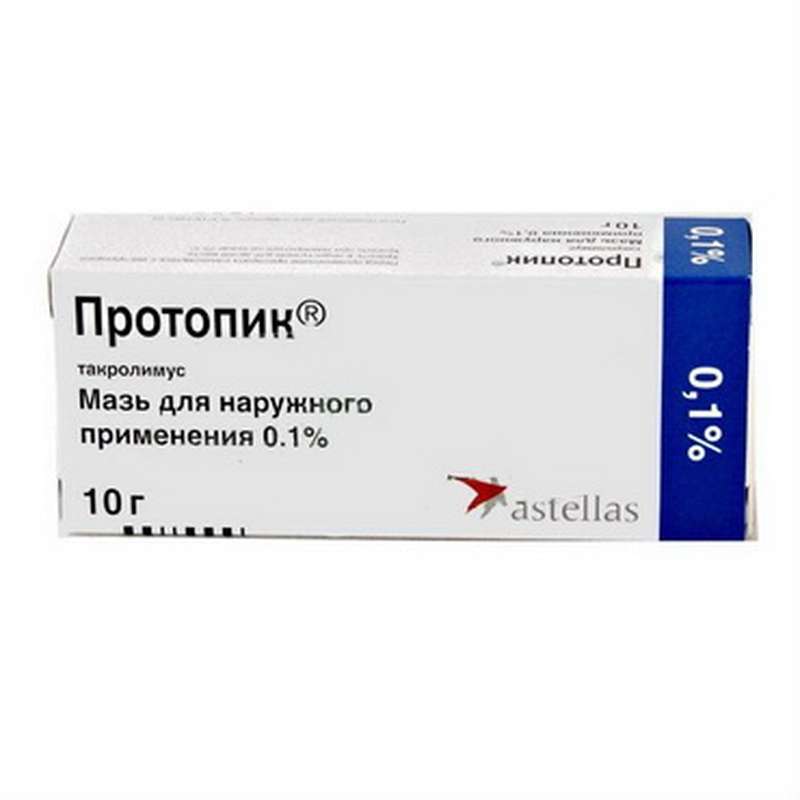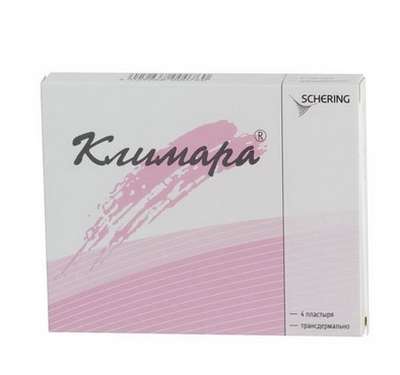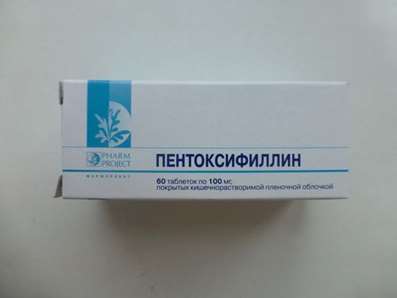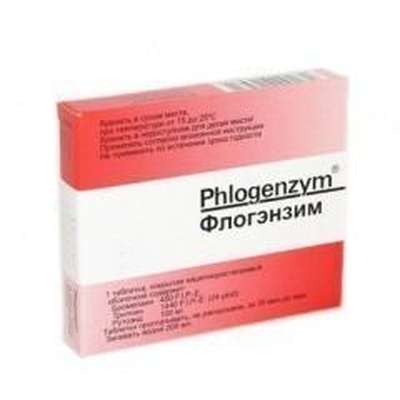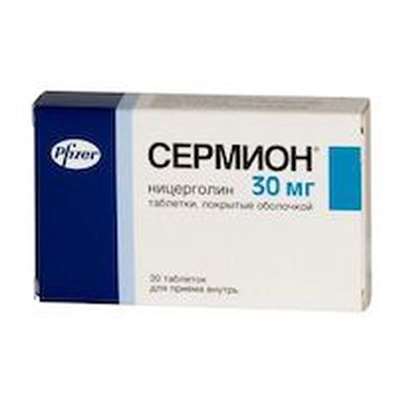Protopic ointment - anti-inflammatory drug for external use. Tacrolimus belongs to the group of calcineurin inhibitors. It binds to a specific cytoplasmic protein called immunophilin (FKBP 12), which is a cytosolic receptor for calcineurin (FK 506). As a result, a complex is formed including tacrolimus, FKBP 12, calcium, calmodulin and calcineurin, which leads to inhibition of the phosphatase activity of calcineurin. This makes it impossible to dephosphorylate and translocate the nuclear factor of activated T-cells (NFAT), which is necessary for the initiation of transcription of genes encoding the production of key cytokines (IL-2 and interferon-gamma) for the T-cell immune response.
In addition, tacrolimus inhibits transcription of genes encoding the production of such cytokines as IL-3, IL-4, IL-5, granulocyte-macrophage colony-stimulating factor (GMPCS) and tumor necrosis factor (TNF-α) that participate in the initial stages activation of T-lymphocytes.
In addition, under the influence of tacrolimus, the release of inflammatory mediators from mast cells, basophils and eosinophils, as well as a decrease in the expression of FcεRI (high affinity surface receptor for immunoglobulin E) on Langerhans cells, leads to a decrease in their activity and presentation of the antigen to T lymphocytes.
Ointment containing tacrolimus does not affect the synthesis of collagen and, thus, does not cause skin atrophy.
Tacrolimus belongs to the group of calcineurin inhibitors. It binds to a specific cytoplasmic protein called immunophilin (FKBP12), which is a cytosolic receptor for calcineurin (FK506). As a result, a complex is formed, including tacrolimus, FKBP12, calcium, calmodulin and calcineurin, which leads to inhibition of the phosphatase activity of calcineurin. This makes it impossible to dephosphorylate and translocate the nuclear factor of activated T-cells (NFAT), which is necessary for the initiation of transcription of genes encoding the production of key cytokines (IL-2 and interferon-gamma) for the T-cell immune response. In addition, tacrolimus inhibits the transcription of genes encoding the production of such cytokines as IL-3, IL-4, IL-5, granulocyte-macrophage colony-stimulating factor (GMPCS) and tumor necrosis factor (TNF-a), which take part in the initial stages activation of T-lymphocytes. In addition, under the influence of tacrolimus, the release of inflammatory mediators from mast cells, basophils and eosinophils, as well as a decrease in the expression of FcεRI (high affinity surface receptor for immunoglobulin E) on Langerhans cells, leads to a decrease in their activity and presentation of the antigen by T lymphocytes. Ointment tacrolimus does not affect the synthesis of collagen and, thus, does not cause skin atrophy.
Indications:
Ointment Protopic applied at a dosage of 0.1% in adults for the treatment of atopic dermatitis (moderate severity and severe forms) in case of its resistance to other external therapy or contraindications to such.
Contraindications:
- genetic defects of the epidermal barrier, such as the Netherton syndrome;
- generalized erythroderma (due to the risk of a progressive increase in systemic absorption of tacrolimus);
- Pregnancy;
- the period of lactation (breastfeeding);
- Children's and adolescence under 16 years (for 0.1% of ointment);
- Children's age to 2 years (for 0.03% of ointment);
- Hypersensitivity to tacrolimus, to auxiliary substances, to macrolides.
Caution should be used Protopik in decompensated liver failure, with extensive skin lesions, especially long courses, as well as in children.
Suggested Use:
Adult Protopic ointment is applied a thin layer on the affected areas of the skin. The drug can be used on any part of the body, including the face and neck, in the area of skin folds. Do not apply the drug to the mucous membranes and under occlusive dressings.
Treatment should begin with the application of 0.1% ointment Protopik twice a day and continue until complete clearance of lesions. As you improve, you can reduce the frequency of applying 0.1% of the ointment or switch to the use of 0.03% ointment Protopic. In case of recurrence of symptoms, resumption of treatment with 0.1% ointment Protopic twice a day should be resumed. If the clinical picture allows, an attempt should be made to reduce the frequency of application of the drug, or use a lower dosage - 0.03% ointment Protopic.
Use in elderly people (65 years and older)
There are no special applications for elderly people.
Usually, improvement is observed within one week from the start of therapy.
If signs of improvement in the background of therapy are absent within two weeks, consideration should be given to changing the therapeutic tactics.
Treatment of exacerbations
Ointment Protopic can be used for a short time or for a long time in the form of periodically repeated courses of therapy. Treatment of affected areas of the skin is carried out until the disappearance of clinical manifestations of atopic dermatitis. As a rule, improvement is observed during the first week of treatment. If signs of improvement are not observed within two weeks of starting the use of the ointment, other options for further treatment should be considered. Treatment should be resumed with the appearance of the first signs of exacerbation of atopic dermatitis.
Prevention of exacerbations
To prevent exacerbations and increase the duration of remission in patients with frequent (more than 4 times a year) exacerbation of the disease in history, maintenance therapy with Protopic ointment is recommended. The expediency of prescribing maintenance therapy is determined by the effectiveness of the previous treatment according to the standard schedule (2 times a day) for no more than 6 weeks.
With maintenance therapy ointment Protopic should be applied 2 times a week (for example, on Monday and Thursday) on skin areas, usually affected by exacerbations.
The time between application of the drug should be at least 2-3 days. Adults and adolescents 16 years of age and older use 0.1% ointment Protopik. If signs of exacerbation appear, you should switch to the usual regimen of treatment with Protopic ointment (see the section "Treatment of exacerbations").
After 12 months of maintenance therapy, it is necessary to evaluate the clinical dynamics and decide whether to continue the preventive use of Protopic ointment. Children should be temporarily discontinued to assess clinical dynamics and then consider whether to continue supporting therapy.
Side effects:
Frequency of occurrence of undesirable reactions: very often (> 1/10), often (> 1/100, 1/1000, Local reactions: very often - burning and itching sensation, often - sensation of heat, redness, pain, irritation, rash in place As a rule, they are expressed moderately and pass within the first week after the start of treatment.
Infections: often - herpetic infection (herpes simplex of the face and lips, varicelliform hives of Kaposi).
Dermatological reactions: often - folliculitis, itching; rarely - acne.
From the side of the peripheral nervous system: often - paresthesia, hyperesthesia.
Other: often - alcohol intolerance (face hyperemia or symptoms of skin irritation after drinking).
During the entire period of observation of the drug, single cases of rosacea, malignization (cutaneous and other types of lymphomas, skin cancer) were recorded.
Special instructions:
Protopic ointment can not be used in patients with congenital or acquired immunodeficiency or in patients who take immunosuppressants.
During the application of the Protopic ointment, sunlight, sunburn, UV-B or A therapy with psoralen (PUVA-therapy) should be avoided.
Protopik ointment should not be used to treat lesions that are considered to be potentially malignant or pre-malignant.
For 2 hours on the skin areas on which the ointment was applied, you can not use emollients.
The efficacy and safety of the use of Protopic ointment in the treatment of infected atopic dermatitis has not been evaluated. If signs of infection are present prior to the appointment of Protopik ointment, appropriate therapy is necessary. The use of Protopic ointment may be associated with an increased risk of developing a herpetic infection. In the presence of signs of herpetic infection, one should individually evaluate the relationship between the benefit and the risk of using Protopic.
In the presence of lymphadenopathy, the patient should be examined before starting therapy and observed during the period of application of the ointment. In the absence of an obvious cause of lymphadenopathy or in the presence of symptoms of acute infectious mononucleosis, it is necessary to stop using the Protopic ointment.
Avoid contact with ointment in the eyes and mucous membranes (in case of accidental ingestion, the ointment should be carefully removed and / or rinsed with water).
It is not recommended to apply Protopic ointment for occlusive dressings and wear tight, airtight clothing.
Just like using any other topical medication, patients should wash their hands after applying the ointment, except when the ointment is applied to the area of the hands for therapeutic purposes.
Packaging:
- Comes in original packaging. Item is brand new and unopened.
Storage:
- Keep away from direct sunlight.
- Keep locked and away from children.
- Store in dry place at room temperature.
- Do not exceed storage temperature higher than 25 C
Important notice- the outer box design may vary before prior notice!

 Cart
Cart
